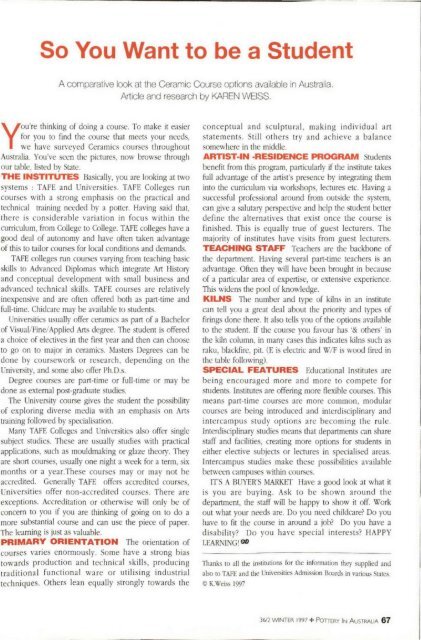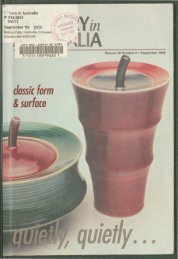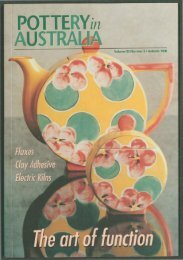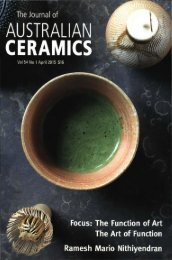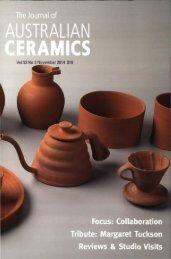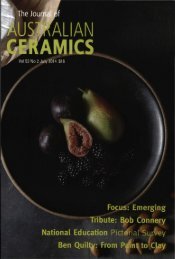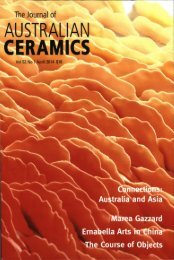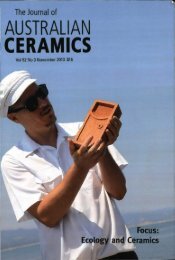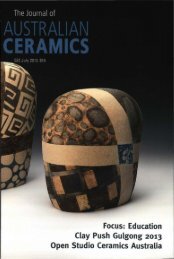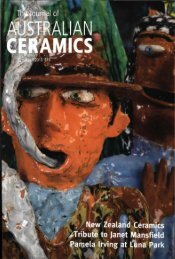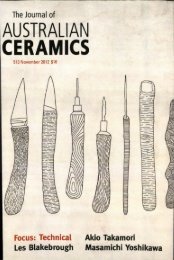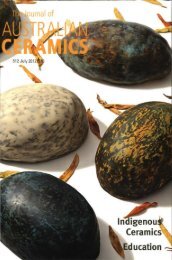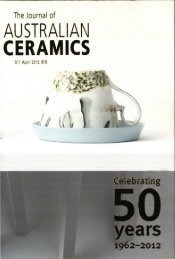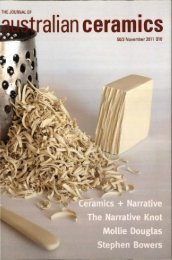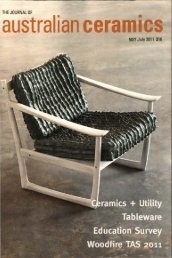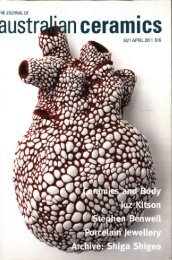Pottery In Australia Vol 36 No 2 Winter 1997
Create successful ePaper yourself
Turn your PDF publications into a flip-book with our unique Google optimized e-Paper software.
So You Want to be a Student<br />
A comparative look at the Ceramic Course options available in <strong>Australia</strong>,<br />
Article and research by KAREN WEISS,<br />
You're thinking of doing a course. To make it easier<br />
for you to find the course that meets your needs,<br />
we have surveyed Ceramics courses throughout<br />
<strong>Australia</strong>. You've seen the pictures, now browse through<br />
our table, listed by State,<br />
THE INSTITUTES I:lasically, you are looking at two<br />
systems: TAfE and Universities, TAfE Colleges run<br />
courses with a strong emphasis on the practical and<br />
technical training needed by a pOller. Having said that,<br />
th ere is considerable va riation in focus within the<br />
curriculum, from College to College, T AFE colleges have a<br />
good deal of autonomy and have often taken advantage<br />
of this to tailor courses for local conditions and demands,<br />
TAFE colleges run courses varying from teaching basic<br />
skills to Advanced Diplomas which integrate An Hi tory<br />
and conceptual development with small business and<br />
advanced technical skills, TAFE courses arc relatively<br />
inexpensive and are otien offered both as pan-time and<br />
full-time, Chidcare may be ava ilable to students,<br />
Universities usually offer cer'dmics as pan of a Bachelor<br />
of VisuaVFinel Applied Arts degree, The student is offered<br />
a choice of electives in the first year and then can choose<br />
to go on to major in ceramics, Masters Degrees can be<br />
done by cou rsework or research, depending on the<br />
University, and some also offer Ph,D,s,<br />
Degree cou rses are pan-time or full -time or may be<br />
done as external post-graduate studies,<br />
The University course gives the student the possibility<br />
of exploring diverse media with an emphasis on Arts<br />
training followed by speCialisation,<br />
Many TAFE Colleges and Universities also offer single<br />
subject studies, These are usually studies with practical<br />
applications, such as mouldmaking or glaze theory, They<br />
are shon courses, usually one night a week for a tenn, sLx<br />
months or a yea r.These cou rses mayor may not be<br />
accredited, Generally TAfE offers accredited courses,<br />
Universities offer non-accredited courses. There arc<br />
exceptions, Accreditation or otherwise will only be of<br />
concem to you if you are thinking of going on to do a<br />
more substantial course and can use the piece of paper.<br />
The Ieaming is just as valuable,<br />
PRIMARY ORIENTATION The orientation of<br />
courses varies enormously, Some have a strong bi as<br />
towards produ ction and tec hnical skills, producing<br />
trad itional fun ctional ware or utilising industri al<br />
techniqu es, Others lean equally strongly towards the<br />
conceptual and scu lptural, making individual art<br />
statem ent s, Still others try and achi eve a balance<br />
somewhere in the middle,<br />
ARTIST·IN -RESIDENCE PROGRAM Smdents<br />
benefit from this program, panicularly if the institute takes<br />
full advantage of the anist's presence by integrating them<br />
into the curriculum via workshops, lectures etc. Having a<br />
successful professional around from outside the system,<br />
can give a salutary perspective and hel p the smdent beller<br />
define the al ternatives that exist once the course is<br />
finish ed, This is equally true of guest lecturers, The<br />
majority of institutes have visits from guest lecturers,<br />
TEACHING STAFF Teachers are the backbone of<br />
the depanment. Having several pan-time teachers is an<br />
advantage, Often they will have been brought in because<br />
of a particular area of expenise, or extensive experience,<br />
This widens the pool of knowledge,<br />
KILNS The number and type of kilns in an institute<br />
can tell you a great deal about the priority and types of<br />
firings done there, Ii also tells you of the options available<br />
to the smdent, If the course you favour has '& others' in<br />
the kiln column, in many cases this indicates kilns such as<br />
raku, blackfire, pi!' (E is electric and \VI IF is wood fired in<br />
the table following),<br />
SPECIAL FEATURES Educational <strong>In</strong>stitutes are<br />
being enco uraged more and more to compete for<br />
smdents, <strong>In</strong>stitutes are offering more flexible courses, This<br />
means part-time courses are more co mmon, modular<br />
courses are being introduced and interdisciplinary and<br />
inte rca mpu s stud y options are becoming the rule,<br />
<strong>In</strong>terdiSCiplinary studies means that depanments can share<br />
sta ff and facilities, creating more options for students in<br />
either elective subjects or lectures in specia lised areas,<br />
<strong>In</strong>tercampus studies make these possibilities available<br />
between campuses within courses,<br />
IT'S A BUYER'S MARKET I-lave a good look at what it<br />
is you are buying, Ask to be shown around the<br />
depanment, the staff will be happy to show it off. Work<br />
out what your needs are, Do you need childcare' Do you<br />
have to fit the course in around a job' Do you have a<br />
disabi lit y' Do you have special interests' HAPPY<br />
LEARNING' oo<br />
ll1anks 10 all the institutiOns for the information [hey supplied and<br />
also to TAFE and the Universities Admission Boards in various SHHCS.<br />
C K.Weiss t997<br />
<strong>36</strong>/2 WINTER 19'17 + PonERY IN AUSTRALIA 67


